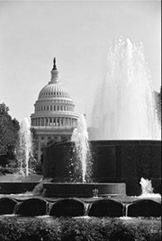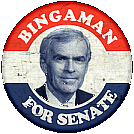About Senate Legislation

There are four types of legislation: bills, joint resolutions, concurrent resolutions, and simple resolutions. A majority of introduced legislative items are bills, which deal with domestic and foreign issues and The U.S. Capitol Dome as seen from one of the many parks on Capital Hill. A water fountain in the foreground sprays water high into the air. Because of the perspective, the water appears to reach the height of the Capitol dome in the background.programs and also appropriate money to various government agencies and programs. Joint resolutions are used for continuing or emergency appropriations. They can also be used to propose amendments to the Constitution. Such resolutions must be approved by two-thirds of the Senate and the House of Representatives and ratified by three-fourths of the states in order to become part of the Constitution. Both bills and joint resolutions must be approved by each chamber and signed by the president to become law.
Concurrent and simple resolutions, however, do not have the force of law. Concurrent resolutions must be passed by both chambers and are generally used to make or amend rules that apply to both houses; they can also express the sentiments of both of the houses. For example, a concurrent resolution is used to set the time of Congress' adjournment or to convey congratulations to another country on the anniversary of its independence. Simple resolutions address matters only affecting one chamber, and they are also used to express the sentiments of that chamber, such as offering condolences to the family of a deceased member of Congress or offering advice on foreign policy.
Key Legislation
Honoring the Navajo Code Talkers
 I introduced the bill, "Honoring the Navajo Code Talkers Act," which was signed into law on December 22, 2000. It authorizes the President of the United States to award a gold medal, on behalf of the Congress, to each of the original twentynine Navajo Code Talkers, as well as a silver medal to each man who later qualified as a Navajo Code Talker. These medals are to express recognition by the United States of America and its citizens of the Navajo Code Talkers who distinguished themselves in performing a unique, highly successful communications operation that greatly assisted in saving countless lives and in hastening the end of World War II in the Pacific theater.
I introduced the bill, "Honoring the Navajo Code Talkers Act," which was signed into law on December 22, 2000. It authorizes the President of the United States to award a gold medal, on behalf of the Congress, to each of the original twentynine Navajo Code Talkers, as well as a silver medal to each man who later qualified as a Navajo Code Talker. These medals are to express recognition by the United States of America and its citizens of the Navajo Code Talkers who distinguished themselves in performing a unique, highly successful communications operation that greatly assisted in saving countless lives and in hastening the end of World War II in the Pacific theater.
It has taken too long to properly recognize these soldiers, whose achievements have been obscured by twin veils of secrecy and time. As they approach the final chapter of their lives, it is only fitting that the nation pay them this honor. That's why I introduced this legislation – to salute these brave and innovative Native Americans, to acknowledge the great contribution they made to the Nation at a time of war, and to finally give them their rightful place in history.
With each new successive generation of Americans, blessed as we are in this time of relative peace and prosperity, it is easy to forget what the world was like in the early 1940s. The United States was at war in Europe, and on December 7, 1941, we were faced with a second front as the Japanese Empire attacked Pearl Harbor.
One of the intelligence weapons the Japanese military possessed was an elite group of welltrained English speaking soldiers, used to intercept U.S. communications, then sabotage the message or issue false commands to ambush American troops. Military code became more and more complex – at Guadalcanal, military leaders complained that it took two and one half hours to send and decode a single message.
After being convinced of the possibility of success by the son of a missionary who was raised on the Navajo reservation, the Marine Corps called upon the Navajo Nation to support the military effort by recruiting and enlisting Navajo men to serve as Marine Corps Radio Operators. These Navajo Marines, who became known as the Navajo Code Talkers, used the Navajo language to develop a unique code to communicate military messages in the South Pacific. The code developed by these Native Americans proved unbreakable and was used throughout the Pacific theater.
Their accomplishment was even more heroic given the cultural context in which they were operating. Subjected to alienation in their own homeland and discouraged from speaking their own language, they still stepped forward and developed the most significant and successful military code of the time.
The Code was so successful that military commanders credited it with saving the lives of countless American soldiers and the successful engagements of the U.S. in the battles of Guadalcanal, Tarawa, Saipan, Iwo Jima, and Okinawa. At Iwo Jima, Major Howard Connor, 5th Marine Division signal officer, declared, "Were it not for the Navajos, the Marines would never have taken Iwo Jima." Major Connor had six Navajo Code Talkers working around the clock during the first 48hours of the battle. Those six sent and received over 800 messages, all without error.
In fact, the code was so successful that the Department of Defense kept the Code secret for 23 years after the end of World War II, when it was finally declassified in 1968 – and there lies the foundation of the problem.
If their achievements had been hailed at the conclusion of the war, proper honors would have been bestowed at that time. But the Code Talkers were sworn to secrecy, an oath they kept and honored, but at the same time, one that robbed them of the very accolades and place in history they so rightly deserved. Their ranks include veterans of Guadalcanal, Saipan, Iwo Jima, and Okinawa; they gave their lives at New Britain, Bougainville, Guam, and Peleliu. But, at the end of the war, these unsung heroes returned to their homes on buses – no parades, no fanfare, no special recognition for what they had truly accomplished – because while the war was over, their duty – their oath of secrecy – continued. When the secrecy surrounding the code was finally declassified, only then did a realization of the sacrifice and valor of these brave Native Americans begin to emerge.
Through the presentation of this distinguished award, the Congress expresses the gratitude of an entire nation to these brave and innovative veterans for their contributions and sacrifice in the struggle for freedom and democracy. After long last, we may finally mark that place in history so long overdue the Navajo Code Talkers.
Public Law No. 106-554, signed by the President on 21 December 2000. The bill was part of the Consolidated Appropriations Act for FY2001.
